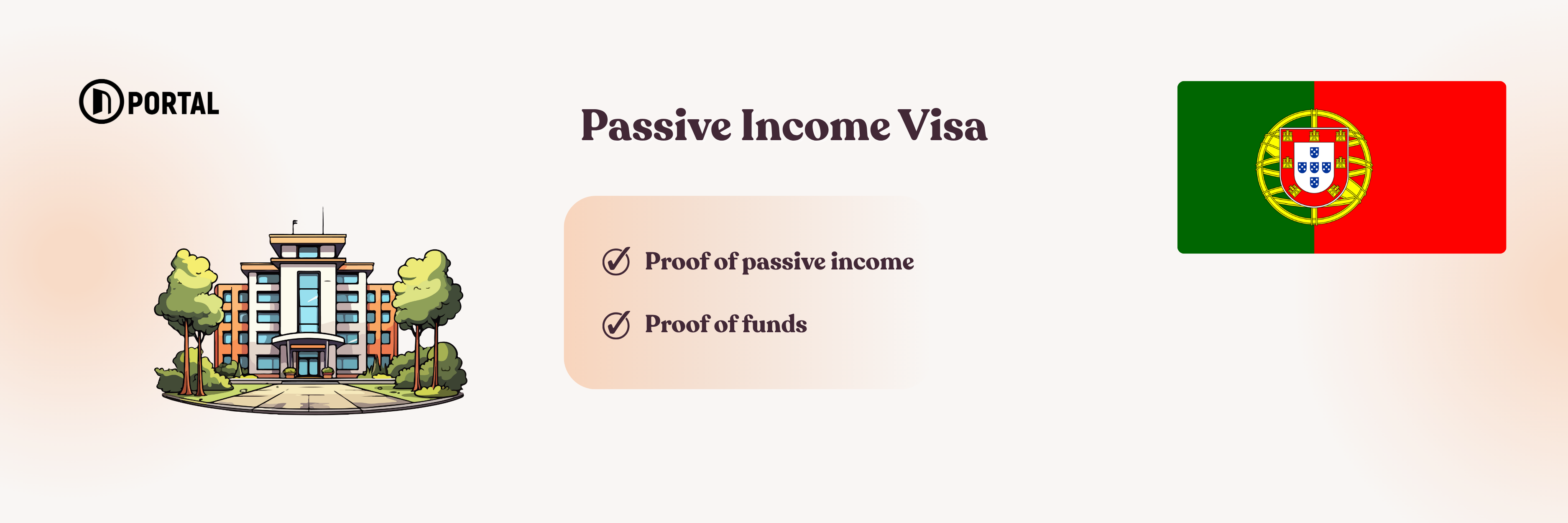
The Portugal Passive Income Visa, officially known as the D7 Visa, is a residency permit for non-EU/EEA/Swiss citizens who can demonstrate a stable income from passive sources—such as pensions, rental income, dividends, or royalties. It is often called the “retirement visa,” though it's also available to financially independent individuals and remote workers. This permit provides a legal pathway to live in Portugal, access healthcare, travel within the Schengen zone, and pursue permanent residency or citizenship.
Eligible Applicants
Must be non-EU/EEA/Swiss nationals, aged 18 or older, with a clean criminal record.
Must show stable passive income from outside Portugal, which may include pensions, rental income, dividends, royalties, interest, or proceeds from intellectual property. Remote salaries typically do not meet the passive criteria.
Minimum Passive Income Thresholds (2025)
Main Applicant: At least €870 per month (≈ €10,440 annually).
Spouse or Dependent Adult: +50% (≈ €435/month)
Each Child: +30% (≈ €261/month)
Example: A family with two adults and two children would need approximately €1,827/month.
Other Required Documents & Conditions
Proof of Accommodation: 12-month lease or property ownership. Airbnb or short stays may not count.
Health Insurance: Private plan of at least €30,000, valid for the first stay.
NIF & Bank Account: Required for residence permit.
Minimum Stay: At least 183 days yearly, or show Portugal as main home.
Access to EU & Schengen Zone: The D7 visa grants entry and travel rights across Schengen countries, plus access to Portuguese public services like healthcare.
Low Financial Threshold: Unlike investment-based residency routes, D7 requires modest passive income, making it a cost-effective option.
Family Inclusion: Spouses, dependent children, and sometimes parents can join under your residency rights.
Foundation for Residence & Citizenship: Initial permit lasts 2 years (renewable for 3 more), with eligibility for permanent residency or citizenship after 5 years.
Potential Tax Advantages: New tax incentives (IFICI, also known as NHR 2.0) offer favorable tax rates to certain professionals. Foreign income may also be exempt under specific conditions.
Imagine a retiree receiving a steady pension of at least €870 per month, plus savings covering one year’s requirement. They secure a 12-month lease in Lisbon and obtain private health insurance. Entering Portugal with a D7 visa, they apply for and receive a two-year residence permit. They spend most of the year locally, qualify for renewal, and after five years, become eligible for permanent residency—and possibly citizenship.
Generally, no. The D7 Visa is intended for income that doesn’t require active effort. Remote salaries are typically considered “active income” and better suited for the digital nomad visa (D8).
Yes—if you can show sufficient savings to cover living expenses, that may be acceptable. Some applicants successfully used sizable savings for approval even without steady passive income.
You must spend at least 183 days per year in Portugal or show your intention for it to be your main residence. Exceeding six consecutive months outside may impact your residency status.
Working for a Portuguese employer is not permitted. However, passive/residual income or remote work for foreign clients is allowed. Should you wish to work locally, you’d need a different visa.
Accepted sources include pensions, rental income, dividends, interest, royalties, and other regular income—ideally documented with statements or contracts.